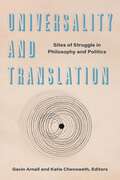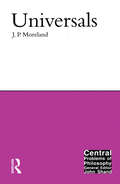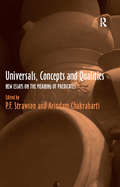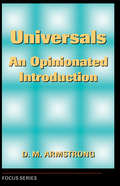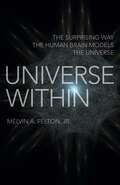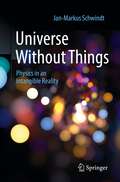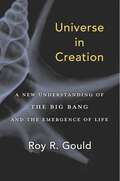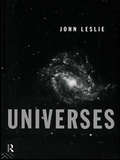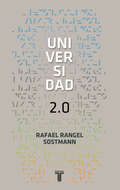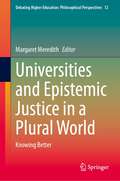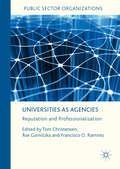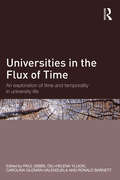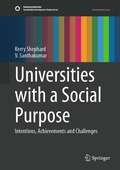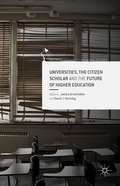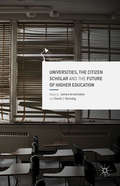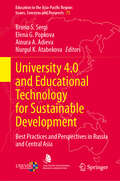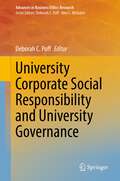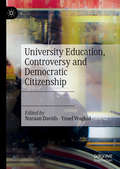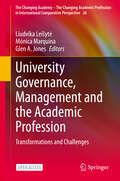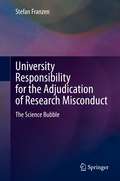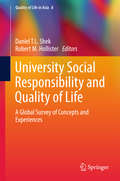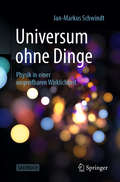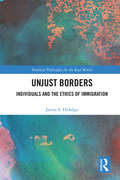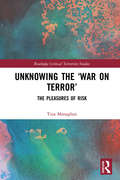- Table View
- List View
Universality and Translation: Sites of Struggle in Philosophy and Politics
by Gavin Arnall and Katie ChenowethWithin contemporary theory, the concepts of translation and universality have frequently been associated with different and even opposed philosophical and political projects: watchwords of either domination or liberation, the erasure of difference or the defense of difference. The universalizing drives of capitalism, colonialism, and other systems of oppression have precipitated widespread suspicion of any appeal to universality. This has led some, in turn, to champion the very notion of universality as antithetical to these systems of oppression. Similarly, recent scholarship has begun to grapple with the fundamental role of translation not only in forging inclusive democratic politics but also, by contrast, in violence, including imperial expansion and global war. The present volume advocates neither for nor against translation or universality as such. Instead, it attends to their insurmountable ambiguity and equivocity, the tensions and contradictions that are internal to both concepts and that exist between them. Indeed, the wager of this volume is that translation, universality, and their relationship name irreducible yet overlapping sites of struggle for a diverse array of struggles on the Left.Drawing from multiple intellectual traditions and orientations, with a special emphasis on deconstruction and Marxism, this volume both reveals and participates in a subterranean current of thought committed to theorizing the dynamic, plural, and ultimately inextricable relationship between translation and universality. Its contributors approach this problem in ways that challenge and unsettle dominant trends within translation studies and critical and postcolonial theory, thereby opening new lines of inquiry within and beyond these fields.
Universals (Central Problems Of Philosophy Ser.)
by James Porter MorelandThings are particulars and their qualities are universals, but do universals have an existence distinct from the particular things describable by those terms? And what must be their nature if they do? This book provides a careful and assured survey of the central issues of debate surrounding universals, in particular those issues that have been a crucial part of the emergence of contemporary analytic ontology. The book begins with a taxonomy of extreme nominalist, moderate nominalist, and realist positions on properties, and outlines the way each handles the phenomena of predication, resemblance, and abstract reference. The debate about properties and philosophical naturalism is also examined. Different forms of extreme nominalism, moderate nominalism, and minimalist realism are critiqued. Later chapters defend a traditional realist view of universals and examine the objections to realism from various infinite regresses, the difficulties in stating identity conditions for properties, and problems with realist accounts of knowledge of abstract objects. In addition, the debate between Platonists and Aristotelians is examined alongside a discussion of the relationship between properties and an adequate theory of existence. The book's final chapter explores the problem of individuating particulars. The book makes accessible a difficult topic without blunting the sophistication of argument required by a more advanced readership.
Universals, Concepts and Qualities: New Essays on the Meaning of Predicates
by P.F. StrawsonAre there universal properties grounding our sense of resemblance or qualitative identity among a number of distinct things or events which appear to form a class, a type or a kind of some other sort? Do universals such as humanness, triangularity, or being an oak exist? Is being a laptop computer a universal which has only recently come into existence? Do predicate expressions, adjectives or abstract nouns refer to objective properties or cognitive contents called concepts? The problem of universals has been at the centre of ancient, medieval, Western and Indian metaphysics. After the logico-linguistic turn in philosophy, this problem re-surfaced in the discourse on the meaning of predicate expressions on the one hand and in the theories of concepts on the other. By introducing newly commissioned essays written by the leading metaphysicians, epistemologists, philosophers of language and philosophers of mathematics, this anthology evinces current analytic philosophy's healthy re-engagement with this perennial problem. Issues raised include: Do properties and other abstract entities exist independently of human language and thought? Can we be in direct perceptual touch with properties or particular qualities? Is a higher order quantification over predicated properties intelligible or indispensable? Insights from current Western thought are compared with recent work in analytic Indian philosophy on such issues. No serious researcher or teacher of contemporary and comparative analytical metaphysics can afford to ignore the essays of this collection.
Universals: An Opinionated Introduction
by D. M. ArmstrongIn this short text, a distinguished philosopher turns his attention to one of the oldest and most fundamental philosophical problems of all: How it is that we are able to sort and classify different things as being of the same natural class? Professor Armstrong carefully sets out six major theories,ancient, modern, and contemporary,and assesses the strengths and weaknesses of each. Recognizing that there are no final victories or defeats in metaphysics, Armstrong nonetheless defends a traditional account of universals as the most satisfactory theory we have.This study is written for advanced students, but as Armstrong goes considerably beyond his earlier work on this topic, it will interest professional scholars as well. Carefully plotted and clearly written, Universals is both a paradigm of exposition and a case study on the value of careful analysis of fundamental issues in philosophy.
Universe Within: The Surprising Way the Human Brain Models the Universe
by Melvin A. FeltonUniverse Within makes the case that the human brain is a physical model of the universe because of structural and dynamical similarities shared between the two systems based on the pictures emerging out of neuroscience and physics, respectively. The relationship between the human brain and the universe revealed by Melvin A. Felton, Jr. might be the missing principle that leads to the theory-of-everything.
Universe Without Things: Physics in an Intangible Reality
by Jan-Markus SchwindtPhysics is written in the language of mathematics, and its findings are based on thousands of experiments. But what kind of picture does physics paint of the world? What do theories like relativity or quantum mechanics contribute to it? How complete is this picture? This book sheds light on how the "things" these theories are about relate to our everyday things, and points out what questions remain unanswered and what problems are involved.In this book, the author presents how physics works, what it can and cannot do. In doing so, he describes the surprising answers that physics provides to many of our questions about the nature of "things" and the world; answers that challenge our intuition in many ways.This book is a translation of the original German 1st edition Universum ohne Dinge by Jan-Markus Schwindt, published by Springer-Verlag GmbH Germany, part of Springer Nature in 2020. The translation was done with the help of artificial intelligence (machine translation by the service DeepL.com). A subsequent human revision was done primarily in terms of content, so that the book will read stylistically differently from a conventional translation. Springer Nature works continuously to further the development of tools for the production of books and on the related technologies to support the authors.
Universe in Creation: A New Understanding of the Big Bang and the Emergence of Life
by Roy R. GouldWe know the universe has a history, but does it also have a story of self-creation to tell? Yes, in Roy R. Gould’s account. He offers a compelling narrative of how the universe—with no instruction other than its own laws—evolved into billions of galaxies and gave rise to life, including humans who have been trying for millennia to comprehend it. Far from being a random accident, the universe is hard at work, extracting order from chaos. Making use of the best current science, Gould turns what many assume to be true about the universe on its head. The cosmos expands inward, not outward. Gravity can drive things apart, not merely together. And the universe seems to defy entropy as it becomes more ordered, rather than the other way around. Strangest of all, the universe is exquisitely hospitable to life, despite its being constructed from undistinguished atoms and a few unexceptional rules of behavior. Universe in Creation explores whether the emergence of life, rather than being a mere cosmic afterthought, may be written into the most basic laws of nature. Offering a fresh take on what brought the world—and us—into being, Gould helps us see the universe as the master of its own creation, not tethered to a singular event but burgeoning as new space and energy continuously stream into existence. It is a very old story, as yet unfinished, with plotlines that twist and churn through infinite space and time.
Universes
by John LeslieFirst published in 2002. Routledge is an imprint of Taylor & Francis, an informa company.
Universes without Us: Posthuman Cosmologies in American Literature
by Matthew A. TaylorDuring the nineteenth and early twentieth centuries, a wide variety of American writers proposed the existence of energies connecting human beings to cosmic processes. From varying points of view—scientific, philosophical, religious, and literary—they suggested that such energies would eventually result in the perfection of individual and collective bodies, assuming that assimilation into larger networks of being meant the expansion of humanity&’s powers and potentialities—a belief that continues to inform much posthumanist theory today.Universes without Us explores a lesser-known countertradition in American literature. As Matthew A. Taylor&’s incisive readings reveal, the heterodox cosmologies of Edgar Allan Poe, Henry Adams, Charles Chesnutt, and Zora Neale Hurston reject the anthropocentric fantasy that sees the universe as a kind of reservoir of self-realization. For these authors, the world can be made neither &“other&” nor &“mirror.&” Instead, humans are enmeshed with &“alien&” processes that are both constitutive and destructive of &“us.&” By envisioning universes no longer our own, these cosmologies picture a form of interconnectedness that denies any human ability to master it.Universes without Us demonstrates how the questions, possibilities, and dangers raised by the posthuman appeared nearly two centuries ago. Taylor finds in these works an untimely engagement with posthumanism, particularly in their imagining of universes in which humans are only one category of heterogeneous thing in a vast array of species, objects, and forces. He shows how posthumanist theory can illuminate American literary texts and how those texts might, in turn, prompt a reassessment of posthumanist theory. By understanding the posthuman as a materialist cosmology rather than a technological innovation, Taylor extends the range of thinkers who can be included in contemporary conversations about the posthuman.
Universidad 2.0
by Rafael Rangel SostmanEl papel de las universidades en nuestra sociedad y su futuro en el desarrollo de la humanidadUna plataforma de reflexión para quienes están al frente de las instituciones.Ante las profundas transformaciones de nuestra sociedad, caracterizada, entre otros aspectos, por vivir un proceso de globalización en medio de la revolución digital, y por los desafíos que para el desarrollo plantea la nueva economía del conocimiento, la Universidad se ve obligada a redefinir la misión que debe desempeñar en la actualidad.Universidad 2.0 es la propuesta de un autor con la experiencia de ser rector durante 27 años de un importante sistema universitario. Según su autor, la misión de la universidad es convertirse en el motor del desarrollo económico, educativo y social; la generación del conocimiento necesario para resolver los grandes retos de desarrollo de nuestra realidad; el involucramiento social; el impulso de la equidad; así como el incremento de las oportunidades a fin de disminuir las brechas socioeconómicas.De tal manera, Universidad 2.0 es una plataforma de reflexión para quienes están al frente de las instituciones universitarias en nuestros países, así como de todos aquellos interesados en el desarrollo equilibrado de la humanidad.
Universities and Epistemic Justice in a Plural World: Knowing Better (Debating Higher Education: Philosophical Perspectives #12)
by Margaret MeredithThis book explains why universities, and academics within them, must engage with the diversity of knowledges and knowers that exist in the world. Through philosophical perspectives, theoretical frameworks and practical examples from around the world, the book searches for opportunities for renewal and inclusion in universities. It explains how higher education can better serve the purposes of social justice by re-evaluating the types of knowledge it promotes. Going beyond the identification and analysis of injustices in ways of knowing in academia, the book offers insights and examples of practices in teaching, research and work with the community which aim to move towards justice on an epistemic level. It argues that inclusion in the domain of knowledge can lead to the generation of knowledges and understandings that are more robust and better equipped to address the pressing needs of the plural worlds outside the university. Contributions are included from authors working in varied disciplinary and cultural contexts in universities, who describe and explicate their work towards identifying epistemic injustice and finding spaces to advance knowledge justice in theory and in practice. The book will be beneficial to academics and those with an interest in the role of universities in serving the public good.
Universities as Agencies: Reputation and Professionalization (Public Sector Organizations)
by Tom Christensen Francisco O. Ramirez Åse GornitzkaThis book discusses how modern universities increasingly use reputation management in relation to internal and external challenges. Universities are increasingly characterized by social embeddedness, relating to many external stakeholders and international markets of students, researchers and research projects. This implies global pressure to standardize, formalize and rationalize their internal organization. The book uses data from China, Norway and US to show how reputation symbols are used and balanced, based on their web pages. Further, it uses extensive data from US universities to show how their internal organization structure is developing over time, related to three types of units/positions - development, diversity and legal offices and roles.
Universities in the Flux of Time: An exploration of time and temporality in university life
by Paul Gibbs Ronald Barnett Oili-Helena Ylijoki Carolina Guzmán-ValenzuelaHigher education and the institution of the university exist in time, their essential nature now continually subject to change: change in students, in knowledge, in structure and in their own communities and those they service. These changes are accompanied by a quickening of time, leading to a heightened intensity of academic life. Yet the nature of time in all the contemporary work on the university has been largely overlooked. This is an important omission and Universities in the Flux of Time has gathered leading academics whose contributions to the volume raise a debate as to the influence and use of time in the university. They do this in an exploration of how these changes are perceived in higher education and how these affect its temporality from local, national and global perspectives. By dealing with the time within the university, the book opens new spaces for the development of the university and civic society. The book develops an interdisciplinary understanding of the temporal issues of engaging with the past, present and future of higher education and its institutions, through consideration of the increased speed demanded for the production of able students and innovative research, to the accountability pressures from central governments and commerce. Reflecting on these issues in the higher education sector, Universities in the Flux of Time is split into three parts, with each one addressing time and its multiple relationships with the university: Past, present and future Knowledge and time Living with time This volume will provide essential reading for those on higher education studies courses as well as a wider audience of managers, practitioners, policy makers, academics and students and from many disciplinary perspectives including sociology, organisation studies, social psychology and the philosophy of education.
Universities with a Social Purpose: Intentions, Achievements and Challenges (Sustainable Development Goals Series)
by V. Santhakumar Kerry ShephardThis book is a narrative of conversations between two professors, with different backgrounds, academic disciplines, life experiences, and from different continents. It shows how their discourse has brought them to a single destination defined by a mutual interest in the social purposes of universities, and a hope in common that their academic efforts will somehow do good in the world. The seventeen internationally-agreed Sustainable Development Goals (SDGs) provide focus for aspirations and plans regarding sustainability, but notably, the SDGs’ targets and indicators rarely provide detailed accounts of who is expected to enact change. This book addresses the role of higher education in this context and explores the social purposes of universities and their relation to the Sustainable Development Goals. It presents an academic analysis of this complex situation, based on insights from published literature on higher education, and the personal but very different experiences of two professors with this shared interest.
Universities, the Citizen Scholar and the Future of Higher Education (Palgrave Critical University Studies)
by David J. Hornsby James ArvanitakisThe future of higher education is in question as universities struggle to remain relevant to the present and future needs of society. The context in which learning occurs is rapidly changing and those engaged and interested in the place and position of university education need to figure out to adapt. This book embodies a vision for higher education where graduate attributes and proficiencies are at the core of the academic project, where degree programs move beyond disciplinary content and where students are encouraged to be Citizen Scholars. Through a series of cross-disciplinary and contextual cases, the contributors to this book articulate how this vision can be achieved in our pedagogical environments, future proofing higher education.
Universities, the Citizen Scholar and the Future of Higher Education (Palgrave Critical University Studies)
by David J. Hornsby James ArvanitakisThe future of higher education is in question as universities struggle to remain relevant to the present and future needs of society. The context in which learning occurs is rapidly changing and those engaged and interested in the place and position of university education need to figure out to adapt. This book embodies a vision for higher education where graduate attributes and proficiencies are at the core of the academic project, where degree programs move beyond disciplinary content and where students are encouraged to be Citizen Scholars. Through a series of cross-disciplinary and contextual cases, the contributors to this book articulate how this vision can be achieved in our pedagogical environments, future proofing higher education.
University 4.0 and Educational Technology for Sustainable Development: Best Practices and Perspectives in Russia and Central Asia (Education in the Asia-Pacific Region: Issues, Concerns and Prospects #75)
by Elena G. Popkova Bruno S. Sergi Ainura A. Adieva Nurgul K. AtabekovaThis book introduces &“University 4.0&” as an Educational Technology subject and studies in detail the processes of formation and development of Universities 4.0. It includes materials and applied recommendations for improving the management of Universities 4.0, as well as for the transition to Educational Technology through the creation of Universities 4.0. It also contains recommendations for improving the effectiveness of state regulation of Educational Technology in general and Universities 4.0, in particular, in the interests of sustainable development. The first part of the book forms the theoretical foundations of University 4.0 as a scientific concept, presenting a view from the standpoint of sustainable development. The second part defines the place of University 4.0 in the sustainable development strategy of Russia and Central Asia. The third part reveals best practices for creating and developing Universities 4.0 in Russia and Central Asia. The fourth part focuses on the contribution of Universities 4.0 to the sustainable development of Russia and Central Asia. The fifth part provides recommendations for improving University 4.0 management in support of the sustainable development of Russia and Central Asia. This book is suitable for scholars studying higher education, the society and economy of Russia and Central Asia, and sustainable development. It is also of interest to practising experts, university leaders and state regulators of education.
University Corporate Social Responsibility and University Governance (Advances in Business Ethics Research #8)
by Deborah C. PoffThis book provides new and original research on the purpose and functions of universities from the perspective of corporate social responsibility. It addresses professional ethics questions that relate to universities as corporate citizens. Divided into two sections, the book starts out with an examination of the concept of universities. It explores the differences between historic and contemporary universities, the history and nature of university governance, the role of higher education, and the problem of domination and subjugation in a management context. The second section looks at the faculty, the students, and the role of spirituality in the university and research. It examines such themes as the nature of faculty and professors, faculty as change agents, diversity, inclusivity and incivility, academic integrity, citizenship of students, and ethical responsibility of researchers. The book calls on the expertise from both the fields of business and professional ethics and university management and leadership. It approaches the subject from an interdisciplinary perspective.
University Education, Controversy and Democratic Citizenship
by Nuraan Davids Yusef WaghidThis book explores the role of the university in upholding democratic values for societal change. The chapters advocate for the moral virtue of democratic patriotism: the editors and contributors argue that universities, as institutions of higher learning, can encourage the creation of critical and patriotic citizens. The book suggests that non-violence, tolerance, and peaceful co-existence ought to manifest through pedagogical university actions on the basis of educators’ desire to cultivate reflectiveness, criticality, and deliberative inquiry in and through their academic programmes. In a way, universities can respond more positively to the violence on our campuses and in society if public and controversial issues were to be addressed through an education for democratic citizenship and human rights.
University Governance, Management and the Academic Profession: Transformations and Challenges (The Changing Academy – The Changing Academic Profession in International Comparative Perspective #26)
by Glen A. Jones Liudvika Leišytė Mónica MarquinaThis volume investigates governance and management of higher education through the lens of the academic profession. Drawing on data from the Academic Profession in the Knowledge-based Society project, an international collaborative research study involving the administration of a common survey to faculty in more than twenty countries, this volume explores important issues of governance and management in relation to, and frequently from the perspective of, the academic profession. It analyzes the complex inter-relationships and intersections between decision processes and structures at both the system and institutional levels and the experiences and perceptions of the academics who play a central role in fulfilling the mission of higher education. Theoretical chapters review key concepts that have grounded the analysis of external (system-level) and internal (institution-level) governance, while the core chapters provide original empirical research, many involving comparative studies, exploring key challenges such as managerialism, gender, shifts in faculty perceptions of influence, and the importance of communication and institutional leadership. Chapter 4,10,11 and 12 of this book are available open access under a CC BY 4.0 license at link.springer.com.
University Responsibility for the Adjudication of Research Misconduct: The Science Bubble
by Stefan FranzenThis book offers a scientific whistleblower’s perspective on current implementation of federal research misconduct regulations. It provides a narrative of general interest that relates current cases of research ethics to philosophical, historical and sociological accounts of fraud in scientific research. The evidence presented suggests that the problems of falsification and fabrication remain as great as ever, but hidden because the current system puts universities in charge of investigations and permits them to use confidentiality regulations to hide the outcomes of investigations. The book documents the significant conflict of interest that arises because federal regulation gives universities the responsibility to conduct investigations of their own faculty with severely limited oversight. The book is intended for young research scientists or anyone who wishes to understand the challenges faced by scientists in the workplace today. The central thread in the book is an exclusive account of an experienced research scientist who was the first to expose the facts that led to the longest running research misconduct investigation in the history of the National Science Foundation.
University Social Responsibility and Quality of Life
by Daniel T. L. Shek Robert M. HollisterThis book provides a critical review of the theory and practice of University Social Responsibility. In addition to addressing the nature of and concepts surrounding University Social Responsibility, as well as its ties to areas such as service learning or engaged scholarship, the book also presents effective practices from around the world. Dedicated chapters demonstrate how University Social Responsibility can manifest itself in different types (civic, moral, economic or global responsibility), levels (local, national, regional or international), and formats (partnership, venture or joint project), depending on local contexts and needs. The book also focuses on three areas of work - educating students to take on social responsibility, broadening access to education, and applying knowledge to societal problems - to highlight the potential and viable ways University Social Responsibility can be employed to promote quality of life in society. Offering a unique resource, it is intended to stimulate thinking and expand the repertoire of all educators, administrators, and organizations who wish to incorporate societal needs into their core mission and promote quality of life in different communities around the world.
Universum ohne Dinge: Physik in einer ungreifbaren Wirklichkeit
by Jan-Markus SchwindtDie Physik ist in der Sprache der Mathematik geschrieben, und ihre Erkenntnisse beruhen auf Tausenden von Experimenten. Doch was für ein Bild zeichnet die Physik von der Welt? Was tragen Theorien wie die Relativitätstheorie oder die Quantenmechanik dazu bei? Wie vollständig ist dieses Bild? Dieses Buch beleuchtet, wie sich die „Dinge“, von denen diese Theorien handeln, zu unseren alltäglichen Dingen verhalten und zeigt auf, welche Fragen noch offen sind und welche Probleme damit einhergehen.Der Autor stellt in diesem Buch dar, wie Physik funktioniert, was sie leisten kann und was nicht. Dabei beschreibt er die überraschenden Antworten, die die Physik auf viele unserer Fragen nach der Natur der "Dinge" und der Welt gibt; Antworten, die unsere Intuition vor so manche Herausforderung stellen.
Unjust Borders: Individuals and the Ethics of Immigration (Political Philosophy for the Real World)
by Javier S. HidalgoStates restrict immigration on a massive scale. Governments fortify their borders with walls and fences, authorize border patrols, imprison migrants in detention centers, and deport large numbers of foreigners. Unjust Borders: Individuals and the Ethics of Immigration argues that immigration restrictions are systematically unjust and examines how individual actors should respond to this injustice. Javier Hidalgo maintains that individuals can rightfully resist immigration restrictions and often have strong moral reasons to subvert these laws. This book makes the case that unauthorized migrants can permissibly evade, deceive, and use defensive force against immigration agents, that smugglers can aid migrants in crossing borders, and that citizens should disobey laws that compel them to harm immigrants. Unjust Borders is a meditation on how individuals should act in the midst of pervasive injustice.
Unknowing the ‘War on Terror’: The Pleasures of Risk (Routledge Critical Terrorism Studies)
by Tina ManaghanThis book offers new insights into the excesses and uncanniness of the ‘War on Terror’ via an engagement with the pleasures of risk. Engaging with the unconscious, the excess, the uncanny and the spectacular dimensions of the ‘War on Terror’ – as made evident, for example, in the 2012 London Olympic Games and the 2013 manhunt for the Boston Marathon bombers – leads this book to probe the so-called order of things that has made this war intelligible in both mainstream and critical approaches to Security Studies and International Relations. Specifically, this book brings to light and theorizes the obscene pleasures of the ‘War on Terror’ and its supplementary precautionary risk logic. Coming to grips with this (i.e., the pleasures of risk), ultimately via an engagement with critical psychoanalytic theory, leads this book to argue that we may be other than we think we are within critical International Relations (IR) traditions. Furthermore, albeit without discounting the madness, if not desolation, of the present (extending from the ‘War on Terror’ to the politics of Brexit and Donald Trump), it suggests there may be some relief in that yet. This book will be of much interest to students of critical terrorism studies, critical security studies, political theory and International Relations broadly.
